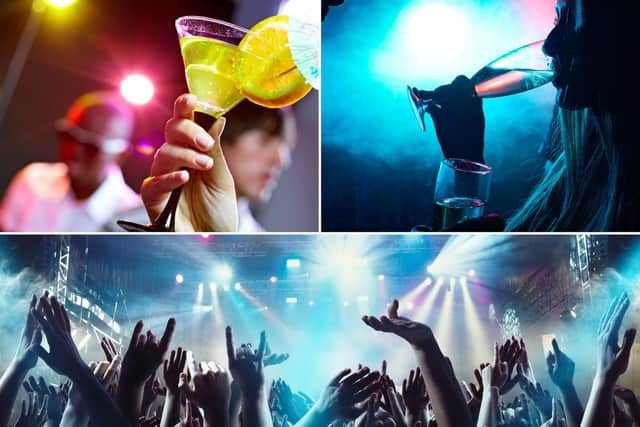Drink spiking: What is drink spiking, what symptoms to look out for, how to stay safe and are injections being used
With a rising number of drink spiking cases including in Edinburgh, across Scotland and the entire UK, campaigners are calling for more to be done to protect particularly women from such incidents.
Spiking refers to putting drugs or alcohol in someone’s drink without their knowledge.
Advertisement
Hide AdAdvertisement
Hide AdGirls Against Spiking is one of the groups calling for more to be done by bars, nightclubs, and the police.
The group also spreads awareness and information about the issue in the hopes of keeping people safe.
With cases of drink spiking increasing, campaigners are putting pressure on venues to take action by boycotting nightclubs in an effort to raise awareness.
Known as Girls Night In, the boycott is taking place in Edinburgh, Dundee, Glasgow, and Nottingham, as well as other cities across the UK.
Here’s a look at what exactly drink spiking is, the recent campaigns surrounding it, and how you can keep yourself and your friends safe on a night out.


What is drink spiking?
Drink spiking involves putting alcohol or drugs into someone’s drink without their knowledge or consent.
According to the NHS, alcohol is more commonly used than drugs.
Adding an extra shot of liquor into someone’s drink causes the person to get drunk faster than expected and can leave them vulnerable.
Advertisement
Hide AdAdvertisement
Hide AdDrugs that are commonly used include Rohypnol (also known as Roofie) and Gamma Hydroxybutyrate (GHB).
Both of these drugs are also known as ‘date-rape’ drugs, as they are often connected with attempting to commit physical or sexual assaults.
However, drink spiking is not always motivated by desire to assault someone.
Recreational drugs like ecstasy, LSD, ketamine, and other so-called ‘party’ drugs have also been used to spike drinks.
With all of the substances mentioned above, spiking someone’s drink can cause serious health problems, including nausea and heart failure.
What’s more, it can often leave the person vulnerable to further dangers while on a night out.
What are the laws around drink spiking?
Spiking someone’s drink with any substances, including alcohol, without their knowledge can result in serious criminal charges.
If spiking is combined with assault, rape, or robbery, additional sentences will be added.
Advertisement
Hide AdAdvertisement
Hide AdDrink spiking carries a maximum 10-year prison sentence and perpetrators face a permanent criminal record.
Symptoms of drink spiking
Because there are so many different substances that can be used to spike someone’s drink, there are lots of different symptoms to look out for as well.
These include:
- Lowered inhibitions
- Loss of balance
- Visual problems
- Confusion
- Nausea
- Vomiting
- Unconsciousness
Most date-rape drugs will take effect within 15 to 30 minutes of being consumed and the symptoms can last for several hours at a time.
What to do if you suspect you’ve been spiked
If you suspect that you or someone you know has been spiked while you’re still out, tell a bar manager or bouncer straight away.
Do not leave the person you believe has been spiked on their own. Stay with them and keep talking to them.
Make sure you take them home yourself and don’t let them leave with anyone you don’t know.
If their condition deteriorates or they have trouble breathing, call an ambulance immediately.
Avoid drinking more alcohol as this can exacerbate the symptoms.
Advertisement
Hide AdAdvertisement
Hide AdIf you or someone you know realises the following day that you might have been spiked, amnesia or loss of memory are common after effects.
If you’re worried that you might have been sexually assaulted but you can’t remember exactly what happened, it’s important to share this with someone you trust.
Consider talking to a trusted friend or family member.
You can talk to the police, your GP, or visit a hospital if you want to seek advice about a potential assault.
If you don’t feel ready for that, there’s no pressure to discuss it before you want to.
There are organisations out there to support you if you need them, including Rape Crisis Scotland and the Rape and Sexual Abuse Support Centre.
How to protect yourself from drink spiking
Groups like Girls Against Spiking are putting more pressure on clubs and bars to protect people from drink spiking.
Some initiative are taking root. For example, some clubs have started to give out drink stoppers for the top of bottles to prevent someone putting an unwanted substance in your drink.
Testing kits with strips that detect certain drugs are also available.
Advertisement
Hide AdAdvertisement
Hide AdIt’s important to note that these kits do not pick up on all drugs and they also will not detect extra alcohol in your drink.
Drink spiking can happy to anyone and in any situation. It’s not a reflection on a person being careless, but there are a few steps you can take to protect yourself.
These include:
- Never leave your or your friends’ drinks unattended.
- Don’t accept drinks from people you don’t know.
- Keep an eye on your friends for any unusual behaviour that might indicate they have been spiked.
What is needle spiking?
In the last few weeks, reports of needle spiking, or spiking by injection, have begun to circulate on social media.
This has sparked enquires from police departments across Scotland, following what Police Scotland has described as “a small number” of reports.
Alleged victims of spiking by injection report finding small, puncture-like marks on their skin the morning after falling ill during a night out.
